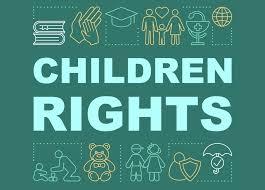Children are the most vulnerable members of society, and they rely on adults to ensure they grow up in a safe, nurturing environment. To protect their well-being, the world recognizes the concept of children's rights, which are special rights meant to ensure that every child can live, learn, and grow in dignity. These rights were formalized by the United Nations Convention on the Rights of the Child (CRC) in 1989, a global agreement that lays out the rights every child deserves.
What Are Children’s Rights?
Children’s rights focus on meeting the needs of children and ensuring their safety, development, and happiness. Here are the core areas:
-
Right to Life and Development
Every child has the right to life, good health, and an environment that supports their physical, emotional, and social development. This includes access to healthcare, proper nutrition, and opportunities for learning and personal growth. -
Right to Education
Education is key to breaking the cycle of poverty and giving children a brighter future. Children have the right to free, quality education that helps them reach their potential. Education also promotes equality by giving every child, regardless of their background, the same chance to succeed. -
Right to Protection
Children must be protected from all forms of harm. This includes protection from physical, emotional, and sexual abuse, exploitation, trafficking, and child labor. Children should also be safe from harmful practices like child marriage and female genital mutilation. -
Right to Participation
Children are not just passive recipients of care—they have the right to express their opinions and have a say in decisions that affect their lives. Listening to children and allowing them to participate helps them develop confidence and decision-making skills. -
Right to Non-Discrimination
All children, regardless of their race, gender, religion, disability, or background, are entitled to the same rights. No child should face discrimination or be denied their rights because of who they are or where they come from.
Why Children’s Rights Matter
Children’s rights are crucial because they recognize that children need special care and protection. Without these rights, children are at risk of facing neglect, abuse, or being denied the basic needs required for a healthy upbringing.
Protecting children’s rights is not just about helping individual children—it’s about creating a better future for everyone. When children are safe, educated, and empowered, they grow up to become healthy, productive adults who contribute positively to society.
How You Can Help Protect Children’s Rights
- Raise Awareness: Talk about children’s rights with your family, friends, and community. The more people understand, the more we can work together to protect them.
- Support Organizations: Many organizations, such as UNICEF, work to protect children’s rights around the world. You can support them through donations, volunteering, or simply spreading their message.
- Advocate for Policy Change: Governments have a responsibility to uphold children’s rights. Supporting policies that protect and promote these rights ensures that they are respected and enforced at all levels.
Conclusion
Children’s rights are not optional—they are essential. Every child deserves a chance to grow up in a safe, loving environment, free from harm and full of opportunities to learn and thrive. By understanding and advocating for children’s rights, we can all play a part in ensuring that future generations have the support they need to lead happy, healthy lives.

